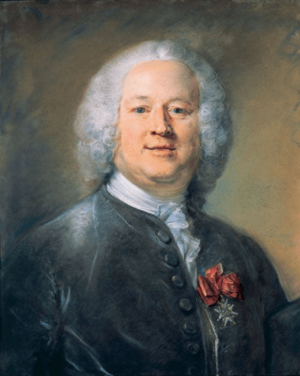John Towneley (translator) facts for kids
Quick facts for kids
John Towneley
|
|
|---|---|

Portrait by Jean-Baptiste Perronneau; Towneley is wearing the Order of Saint Louis
|
|
| Born | 1697 Burnley, Lancashire |
| Died | 1782 (aged 84–85) Chiswick, London |
| Buried |
Chiswick churchyard, London
|
| Allegiance | |
| Years of service | 1731–1746 |
| Battles/wars | War of the Polish Succession Jacobite Rising of 1745 |
| Awards | Order of Saint Louis |
John Towneley (1697–1782) was an English man from a Roman Catholic family. He joined the French Army and supported the Jacobite Rising of 1745, a fight to bring back the old royal family to the British throne. John lived in Paris for about 30 years. While there, he translated a famous English poem called Hudibras into French.
Contents
Early Life and Family
John Towneley was born in 1697 at Towneley Hall in Burnley, Lancashire. He was the second son of Charles Towneley and Ursula Fermor.
The Towneley family was an important Catholic family in Lancashire. Their home, Towneley Hall, even had a private chapel for Catholic worship. During the First English Civil War, John's ancestor Charles Towneley fought for the King and died in battle.
John's grandfather, Richard Towneley, was a scientist and astronomer. He faced many problems because he was Catholic. He was fined and even put in prison.
In 1715, John began to study law. His older brother, Richard, was captured during the Jacobite_rising_of_1715, another attempt to bring back the old royal family. Richard was found innocent, but the trial cost the family a lot of money. Around 1728, John and his younger brother, Francis Towneley, moved to France. Francis also became involved with the Jacobite cause.
The English Catholic families were a small, close group. John may have spent time in Rome, where the exiled King James II's family lived. He might have met Francis Strickland there, who later joined Charles_Edward_Stuart (also known as Bonnie Prince Charlie) in Scotland in 1745.
Career and Adventures
Military Service
In 1731, John Towneley joined the Irish Brigade in the French Army as a lieutenant. He fought in the War of the Polish Succession and was at the Siege of Philippsburg (1734). He was promoted to captain in 1735.
During the Jacobite Rising of 1745, John traveled to Scotland. He carried important messages from the French to the Jacobite leaders. A French official described him as "a man of most intelligence and prudence."
His younger brother, Francis, was captured during the uprising and was executed in July 1746. Later that year, John and 42 other Jacobite officers received money from the French King Louis XV. In December, John received the Order of Saint Louis, a special award for military service.
A Translator's Life
After his military service, John Towneley became part of a famous social group in Paris called a "salon." These were regular meetings where smart people discussed literature and news. John loved an old English poem called Hudibras. It was a funny, mock-heroic poem, meaning it made fun of heroic stories.
Many people thought Hudibras was impossible to translate into French. But John started translating parts of it for fun at the salon. Eventually, his friend John Needham convinced him to translate the whole poem.
The translation was published in 1757. It pretended to be published in London to avoid problems with censorship in France, but it was actually printed in Paris. The book had the English poem on one page and John's French translation on the opposite page. It also included pictures by a famous artist, William Hogarth.
Some people, like Horace Walpole, praised John's translation. However, others felt that while it was accurate, it didn't quite capture the humor and spirit of the original poem.
Later Life and Death
John Towneley lived in Paris for about 30 years and never married. He died in 1782 in Chiswick, London, at his nephew's home. He was buried in Chiswick churchyard.
 | Misty Copeland |
 | Raven Wilkinson |
 | Debra Austin |
 | Aesha Ash |

